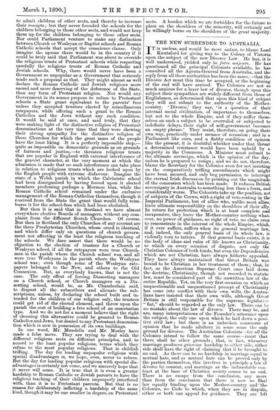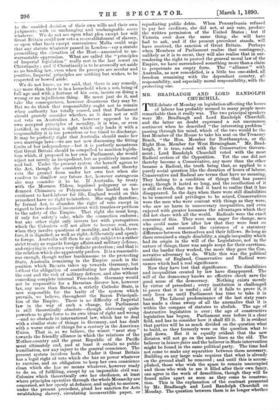THE NEW SURRENDER TO AUSTRALIA.
IT is useless, and would be most unfair, to blame Lard Knutsford for giving way to the Colony of Victoria upon the subject of the new Divorce Law. He has, it is well understood, yielded only to force majeure. He has questioned all the principal Colonists available, he has consulted all the Agents-General from Australia, and the reply from all these authorities has been the same,—that the Divorce Act must this time be accepted, or the beginning of the end will have arrived. The Colonies are not so much anxious for a laxer law of divorce, though upon this subject their sympathies are widely different from those of Englishmen, as determined that upon this kind of subject they will not submit to the authority of the Mother- country. Divorce,' they say, is a question of their internal social civilisation, of importance to themselves, but not to the whole Empire, and if they suffer them- selves on such a subject to be overruled or subjected to indefinite delays, their right of self-government becomes an empty phrase.' They insist, therefore, on going their own way, practically under menace of secession ; and in a Parliament like ours, and a flabby condition of opinion like the present, it is doubtful whether under that threat a determined resistance would have been upheld by a majority in the Commons. A Minister must submit to the ultimate sovereign, which is the opinion of the day, unless he is prepared to resign ; and we do not, therefore, blame the Secretary for the Colonies even for not insisting on the comparatively trifling amendments which might have been secured, and only beg permission to interriqt the eternal Irish discussion by pointing out the magnitude of the concession which has been made. It reduces British sovereignty in Australia to something less than a form, and considerably worse. The Colonists take up the position, not of subjects of the Crown, with a right of veto resting in the Imperial Parliament, but of allies who, unlike most allies, leave ultimate responsibility on the shoulders of their ally. In return for protection which is at least complete and inexpensive, they leave the Mother-country nothing what- ever, no power of guidance, no right of veto, no claim even to remonstrate in the interest of the whole Empire, whit/1i, if it ever suffers, suffers when its general marriage law, and, indeed, the only general basis of its whole law, is violently torn to tatters. If that general basis exists, it is the body of ideas and rules of life known as Christianity, to which on every occasion of dispute, not only the Christian Colonies of both kinds, but even the Dependencies which are not Christian, have always hitherto appealed. They have always maintained that Great Britain was bound to be Christian in her treatment of them ; that, in fact, as the American Supreme Court once laid down the doctrine, Christianity, though not recorded in statute law, must be considered part of the unwritten law of the entire Republic. Yet, on the very first occasion on which an unquestionable and unquestioned precept of Christianity has come into conflict with their own wills, the Austra- lians have insisted that their own wills, although Great Britain is still responsible for the supreme legislative "fiat," should be regarded as the only law. There can be no mistake about the law of divorce. There may be, and are, many interpretations of the Founder's utterance upon the subject, the only one upon which he laid down a posi- tive civil law; but there is an unbroken consensus of opinion that he made adultery in some sense the only ground for divorce. The Australian Colonists—for all the Colonies intend to follow the same course—insist oat there shall be other grounds ; that, in fact, whenever marriage produces grievous hardship to either side, either side shall have the right of claiming that it be brought to an end. As there can be no hardship in marriage equal to mutual hate, and as mutual hate can be proved only by the parties themselves, this involves in principle a law of divorce by consent, and marriage as the indissoluble con- tract at the base of Christian society comes to an end. There is no escape from the conclusion, any more than from the conclusion that there is now no *filial law equally binding upon the Mother-country and 'the Colonies, no Code to which, when they are in dikiiite, either or both can appeal for guidance. They are left full age and with a fortune of his own, insists on doing a take the consequences, however disastrous they may be. CHURCHILL.
she may consider it to be. H Australia, by treaty They belong to a condition of things that has passed with the Mormon Elders, legalised polygamy or con- away, though it lasted so long, and the recollection of it demned Chinamen or Polynesians who landed on her is still so fresh, that we find it hard to realise that it has continent to hard-labour for life, England would on this disappeared. In the days when there were still disabilities precedent have no right to interfere. She ought therefore, to be removed and privileges to be seized, Conservatives by formal Act, to abandon the right of veto except in were the men who were content with things as they were, regard to laws deemed inconsistent with treaties or perilous who saw no harm in unnecessary inequalities, and even to the safety of the Empire. That right she must keep, enjoyed with greater keenness the advantages which they if only for safety's sake, while the connection endures ; did not share with all the world. Radicals were the exact but any other right only invests her with prerogatives converse of this. They were men eager for change, men which the Colonists will not allow to become real, even who could name law after law that they were bent on when they involve questions of morality, and which, there- repealing, and resented the existence of a statutory fore, it is dignified, as well as right, deliberately and openly difference between themselves and their fellows. So long as to forego. Australia will then be an ally subject to a rather there remained a single disability, a single inequality which strict treaty as regards foreign affairs and military defence, had its origin in the will of the Legislature, not in the and enjoying in return a very definite protection ; and that is nature of things, there was ample scope for their exertions, the relation which she apparently prefers. It is a reasonable and the harder they worked, the more they gave the Con- one enough, though rather burdensome to the protecting servative adversary to do. While this was the political State, Australia remaining in the Empire much in the condition of England, Conservative and Radical were position which Bavaria takes up towards Germany, but names which had a real significance. without the obligation of contributing her share towards Now they have lost that significance. The disabilities the cost and the risk of military defence, and also without and inequalities created by law have disappeared. The conceding complete internal Free-trade. Germany would will of the democracy knows no effective check save the not be responsible for a Bavarian divorce law, however good sense of the democracy. Nothing exists merely lax, any more than Bavaria, a strictly Catholic State, is by virtue of precedent ; every institution is challenged now responsible for the laxity of the system which to prove that it is useful ; and if it fails to prove it, it prevails, we believe, throughout the Saxon Principali- only lives on until Parliament has time to take it in ties of the Empire. There is no difficulty of Imperial hand. The Liberal predominance of the last sixty years law in the way of such a change, for Parliament has made a clean sweep of all the anomalies that it is is still theoretically absolute—though obviously quite within the compass of statutes to abolish. The age of powerless to give force to its own ideas of right and wrong destructive legislation is over; the age of constructive —and no obstacle in international law, which has to deal legislation has begun. Parliament sees before it a clear with a similar state of things in Germany, and has dealt field, and has to consider how it shall fill it. It is evident with a worse state of things for a century in the American that parties will be as much divided on the question what Union. That is, as we believe, the wisest "next step" to build, as they formerly were on the question what to towards the friendly alliance in which the relations of the pull down. But it is equally evident that the new Mother-country and the great Republic of the Pacific division will not go on the same lines as the old. The must ultimately end, and at least it entails no public believer in laisser-faire and the believer in State intervention humiliation, nor any injury to the general conscience. The might be found in the same political party. The time had present system involves both. Under it Great Britain not come to make any separation between them necessary. has a legal right of veto which she has no power whatever Building on any large scale requires that what is already to exercise, and an obligation to keep her own conscience on the ground shall be removed ; and until this is sworn- clean which she has no means whatever, however ready plished, those who wish the space to remain unoccupied to do so, of fulfilling, except by an impossible civil war. and those who wish to see it filled after their own fancy, Colonies which theoretically owe her obedience, at least can agree in the work of demolition, though they will be where principles operative through the whole Monarchy are found miles apart as soon as they come to construe- concerned, set her openly at defiance, and might to-morrow, tion. This is the explanation of the contrast presented under the present precedent, plead her sanction for Acts by Mr. Bradlaugh and Lord Randolph Churchill on establishing slavery, circulating inconvertible paper, or Monday. The question between them is no longer whether to the unaided decision of their own wills and their own repudiating public debts. When Pennsylvania refused judgments, with no unchanging and unchangeable nexus to pay her creditors, she did not, at any rate, produce whatever. We do not see upon what plea except her will the written permission of the -United States ; but if Great Britain could now veto a re-establishment of slavery, Victoria ever does the same thing, she will have or upon what basis except convenience Malta could urge had to ask, and if the present precedent stands, will that any statute whatever passed in London—say a statute have received, the sanction of Great Britain. Perhaps proscribing the elevation of the Host—amounted to un- when Members of Parliament realise that contingency, warrantable oppression. What are called the " principles unlikely as it is to occur, they will also realise that in sur- of Imperial legislation " really rest in the last resort on rendering the right to protect the general moral law of the Christianity ; and if Christianity is to be avowedly set aside Empire, we have surrendered something more than a claim as no binding law, even when its precepts are secular and to perpetuate an empty form. The " alliance " with positive, Imperial principles are nothing but wishes, to be Australia, as now remodelled, is a little too one-sided, all







































 Previous page
Previous page